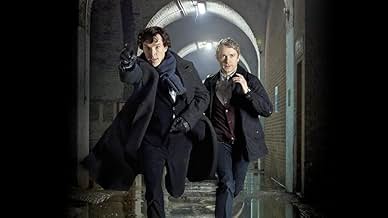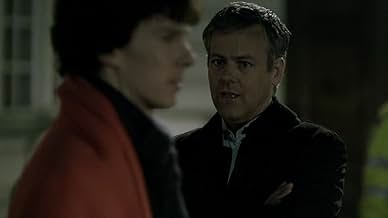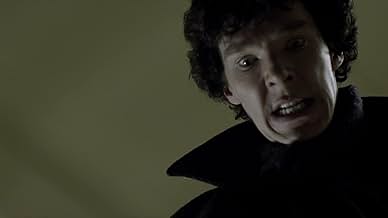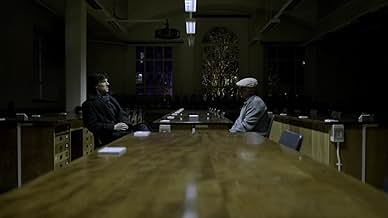War vet Dr. John Watson returns to London in need of a place to stay. He meets Sherlock Holmes, a consulting detective, and the two soon find themselves digging into a string of serial "suic... Read allWar vet Dr. John Watson returns to London in need of a place to stay. He meets Sherlock Holmes, a consulting detective, and the two soon find themselves digging into a string of serial "suicides."War vet Dr. John Watson returns to London in need of a place to stay. He meets Sherlock Holmes, a consulting detective, and the two soon find themselves digging into a string of serial "suicides."
- Director
- Writers
- Stars
Siobhan Hewlett
- Helen
- (as Siobhán Hewlett)
Sean Joseph Young
- Gary
- (as Sean Young)
Ben Rufus Green
- Reporter
- (as Ben Green)
- Director
- Writers
- All cast & crew
- Production, box office & more at IMDbPro
8.935.6K
1
2
3
4
5
6
7
8
9
10
Featured reviews
Surprised by how good it is
A contemporary adaptation of the Sherlock Holmes novel 'A Study In Scarlet'.
This is an excellent feature length television episode with a good use of the source material, solid production values and great performances.
The plot loosely follows the concept of the original story but provides enough original material to make it fresh and interesting. Particularly towards the end it gets very compelling, although it's not hugely suspenseful because you know Holmes' life would not really be in danger. You do, as much as Holmes, want to know how the antagonist can do what he claims to do.
What makes it work so well is the star power and charisma of the lead characters. These are two great actors playing two great characters and they constantly entertain thanks in part to the dialogue.
Visually it is excellent, with strong cinematography, editing and art design. I was not completely sold on the amount of title sequences used to help viewers keep up with Holmes' observations, particularly when he explains it a few minutes later, but this is a matter of taste.
Generally, the use of modern technology in place of the traditional devices with the same principle in the books is another strength of the production.
I have avoided this for over 10 years for being yet another Holmes adaptation, but have to admit it surpassed my expectation.
This is an excellent feature length television episode with a good use of the source material, solid production values and great performances.
The plot loosely follows the concept of the original story but provides enough original material to make it fresh and interesting. Particularly towards the end it gets very compelling, although it's not hugely suspenseful because you know Holmes' life would not really be in danger. You do, as much as Holmes, want to know how the antagonist can do what he claims to do.
What makes it work so well is the star power and charisma of the lead characters. These are two great actors playing two great characters and they constantly entertain thanks in part to the dialogue.
Visually it is excellent, with strong cinematography, editing and art design. I was not completely sold on the amount of title sequences used to help viewers keep up with Holmes' observations, particularly when he explains it a few minutes later, but this is a matter of taste.
Generally, the use of modern technology in place of the traditional devices with the same principle in the books is another strength of the production.
I have avoided this for over 10 years for being yet another Holmes adaptation, but have to admit it surpassed my expectation.
Very good, something for everyone.
The show is very good and well-made. Every detail is thought through, and it is very interesting to follow the mind of Sherlock through every moment of the series. Even if you don't like the plot or the acting, then the beautiful scenes of London by day, evening and night will create a atmosphere, you might never forget. In Sherlock you will find something for everyone - whether its the plot, the actors or just the classic story of a detective and his helper. Benedict Cumberbatch is a great choice of actor, and with Martin Freeman on the side they create a powerful match. The long, slim silhouette that is Sherlock next to the small and grey Dr. Watson is a vision you will always remember.
Excellent episode that leaves you wanting more!
Absolutely fantastic episode in the series of Sherlock Holmes!
This series is a great remake of the original Holmes series and novels. The character Holmes is a complex, borderline insane man who loves solving crimes. With his new partner Dr. Watson, they participate in solving the murders happening around town in Central London. This leads to a lot of evidence, weird coincidences, and dangerous situations for both of the men.
I was rather skeptical before watching the episode but was left speechless in the end. The film was funny, exciting, and kept you on the edge of your chair at some points.
Benedict Cumberbatch, playing Sherlock Holmes, is a fantastic actor for this series and handles the character perfectly. His facial expressions are on point and his rude remarks concerning the CSI Anderson and Sergeant Donovan make the room fill with laughter. Holmes' mind is intriguing and his explanations of his discoveries leave you wanting more insight of his overactive mind.
I would definitely recommend this series to anyone who gets a kick out of crimes and solving them. It is a very enjoyable episode that makes you want to watch more. Suddenly, all your spare time will be spent on watching the nine episodes in the three seasons that right now have been aired.
Enjoy your life being taken away by Sherlock!
This series is a great remake of the original Holmes series and novels. The character Holmes is a complex, borderline insane man who loves solving crimes. With his new partner Dr. Watson, they participate in solving the murders happening around town in Central London. This leads to a lot of evidence, weird coincidences, and dangerous situations for both of the men.
I was rather skeptical before watching the episode but was left speechless in the end. The film was funny, exciting, and kept you on the edge of your chair at some points.
Benedict Cumberbatch, playing Sherlock Holmes, is a fantastic actor for this series and handles the character perfectly. His facial expressions are on point and his rude remarks concerning the CSI Anderson and Sergeant Donovan make the room fill with laughter. Holmes' mind is intriguing and his explanations of his discoveries leave you wanting more insight of his overactive mind.
I would definitely recommend this series to anyone who gets a kick out of crimes and solving them. It is a very enjoyable episode that makes you want to watch more. Suddenly, all your spare time will be spent on watching the nine episodes in the three seasons that right now have been aired.
Enjoy your life being taken away by Sherlock!
The very best Sherlock Holmes adaptation there is
Sherlock Holmes has lived on to the 21st century: adapting to its technology, but not its society, Sir Arthur Conan Doyle's iconic conception gets refurbished all around by Mark Gatiss and Steven Moffat and is solving the same crimes he has already been solving more than a hundred years earlier in just a slightly altered fashion in Sherlock, a superb BBC series.
The three-part first series commences with "A Study in Pink" and introduces its titular sleuth in what is easily the most peculiar way of all Sherlock Holmes adaptations: flogging a corpse. Of course, that slightly disturbing start fulfils the mere purpose of solving a death and the next scene reveals that Benedict Cumberbatch's rather young Holmes is not that big of a sociopath. In any case, we have yet to see a more spellbinding and distinctive on-screen portrayal of SH (as he signs his text messages) than the charismatic Briton's and because of that, the changes of character traits in comparison to the novels don't concern me at all. His colleague Dr Watson, often narrowed down to a simple right-hand man in adaptations of lesser quality, is equally uniquely and lovably portrayed by Martin Freeman and the two are the perfect match for each other, delivering amusing pieces of black humour, exchanging small insults, and sharing homoerotic dinners. More first- class acting is to be found in supporting roles, with unexceptionally all cast members making the most out of a witty, funny, and not once boring screenplay written by series creator Moffat himself. Especially Phil Davis as the episode's memorable antagonist and series creator Moffat himself as Holmes's brother Mycroft are dazzling additions to the cast and impress as they are conversationally facing Sherlock's two protagonists.
This particular detective story itself is not among the greatest Sherlock Holmes adventures of all time, but is gripping until the end and expertly interwoven with the exposition and establishment part the series pilot logically brings with it. The cream of the crop is the dialogue though, trotted out at a breakneck pace and ever quotable. "A Study in Pink" is then topped off by technical grandeur, in beautiful captures of London and the characters, properly timed editing with not one scene being either too long or too short, a catchy score blending mysterious and funny musical aspects together, and wonderful set design for 221B Baker Street especially. My only issues with Sherlock are the opposite of grave and can be easily dismissed: for one, Sherlock's inner map of London and some of his deductions fly in the face of reason and for the other, his written thought bubbles shown on screen are fully unnecessary when explained just a moment later.
Otherwise, "A Study in Pink" is outstanding filmmaking on every level and brilliant at transferring the original story into this day and age, with Holmes an avid mobile phone user and Watson a veteran of the Afghanistan war. From this pilot onwards, I've considered Sherlock to be the very best adaptation of the Conan Doyle novels there is and one of the most entertaining TV series into the bargain.
My detective scribblings: "How can people keep themselves safe from these serial suicides?" – "Don't commit suicide." Inspector Lestrade, brimming with useful advice. I was quite surprised about not seeing Sherlock reacting to John's two different ways of pronouncing the word 'assume' within a matter of minutes. "I'm not his date!" More serious shows could profit from running gags. Sherlock Holmes receives almost universal disdain in this series and, as he casually mentions to pickpocket from Lestrade when he's annoying, one can somehow relate to that. What an absolutely magnetic sequence of Sherlock discovering the story behind the pink phone that is: flashbacks, cross-cutting, camera movement, and all the brilliant facial expressions by Benedict Cumberbatch make it by far the pilot's most impressing. Best line of dialogue: "I could be wrong, but I think that's really none of your business." John Watson, teaching kids how to courteously tell someone to bugger off.
The three-part first series commences with "A Study in Pink" and introduces its titular sleuth in what is easily the most peculiar way of all Sherlock Holmes adaptations: flogging a corpse. Of course, that slightly disturbing start fulfils the mere purpose of solving a death and the next scene reveals that Benedict Cumberbatch's rather young Holmes is not that big of a sociopath. In any case, we have yet to see a more spellbinding and distinctive on-screen portrayal of SH (as he signs his text messages) than the charismatic Briton's and because of that, the changes of character traits in comparison to the novels don't concern me at all. His colleague Dr Watson, often narrowed down to a simple right-hand man in adaptations of lesser quality, is equally uniquely and lovably portrayed by Martin Freeman and the two are the perfect match for each other, delivering amusing pieces of black humour, exchanging small insults, and sharing homoerotic dinners. More first- class acting is to be found in supporting roles, with unexceptionally all cast members making the most out of a witty, funny, and not once boring screenplay written by series creator Moffat himself. Especially Phil Davis as the episode's memorable antagonist and series creator Moffat himself as Holmes's brother Mycroft are dazzling additions to the cast and impress as they are conversationally facing Sherlock's two protagonists.
This particular detective story itself is not among the greatest Sherlock Holmes adventures of all time, but is gripping until the end and expertly interwoven with the exposition and establishment part the series pilot logically brings with it. The cream of the crop is the dialogue though, trotted out at a breakneck pace and ever quotable. "A Study in Pink" is then topped off by technical grandeur, in beautiful captures of London and the characters, properly timed editing with not one scene being either too long or too short, a catchy score blending mysterious and funny musical aspects together, and wonderful set design for 221B Baker Street especially. My only issues with Sherlock are the opposite of grave and can be easily dismissed: for one, Sherlock's inner map of London and some of his deductions fly in the face of reason and for the other, his written thought bubbles shown on screen are fully unnecessary when explained just a moment later.
Otherwise, "A Study in Pink" is outstanding filmmaking on every level and brilliant at transferring the original story into this day and age, with Holmes an avid mobile phone user and Watson a veteran of the Afghanistan war. From this pilot onwards, I've considered Sherlock to be the very best adaptation of the Conan Doyle novels there is and one of the most entertaining TV series into the bargain.
My detective scribblings: "How can people keep themselves safe from these serial suicides?" – "Don't commit suicide." Inspector Lestrade, brimming with useful advice. I was quite surprised about not seeing Sherlock reacting to John's two different ways of pronouncing the word 'assume' within a matter of minutes. "I'm not his date!" More serious shows could profit from running gags. Sherlock Holmes receives almost universal disdain in this series and, as he casually mentions to pickpocket from Lestrade when he's annoying, one can somehow relate to that. What an absolutely magnetic sequence of Sherlock discovering the story behind the pink phone that is: flashbacks, cross-cutting, camera movement, and all the brilliant facial expressions by Benedict Cumberbatch make it by far the pilot's most impressing. Best line of dialogue: "I could be wrong, but I think that's really none of your business." John Watson, teaching kids how to courteously tell someone to bugger off.
A great start to the series
John Watson (played by Martin Freeman), an army doctor, is wounded in Afghanistan and invalided out of the Army. Back in London his search for a place to stay leads him to share a flat with Sherlock Holmes (Benedict Cumberbatch), a brilliant but eccentric private detective. He has hardly met Holmes when Holmes gets called in by Detective Inspector Lestrade to help on a case. People have been committing suicide in identical fashion - by a poisoned pill. The police are calling it "serial suicide" but it is clearly the work of a serial killer.
A great start to the series. Intriguing, engaging and sets the tone and background for the series. We are introduced to Holmes' methods and genius, see how Watson and Holmes met and see what Watson brings to the partnership.
Case itself is quite fascinating and a good test of Holmes' intellect.
A great start to the series. Intriguing, engaging and sets the tone and background for the series. We are introduced to Holmes' methods and genius, see how Watson and Holmes met and see what Watson brings to the partnership.
Case itself is quite fascinating and a good test of Holmes' intellect.
Did you know
- TriviaSherlock kissing Mrs. Hudson on the cheek wasn't scripted. Benedict Cumberbatch had known Una Stubbs since he was very young, and it was his reaction on being able to work with someone who was like a mother to him.
- GoofsSherlock and Watson agree to meet at 7 p.m. to view the flat. When they get there, it's broad daylight. This is not quite possible in London unless it's summer, which, judging from the clothes they wear, is not.
- Quotes
Anderson: So we can read her emails, so what?
Sherlock Holmes: Anderson, don't talk out loud. You lower the IQ of the whole street.
- ConnectionsEdited from Sherlock: Unaired Pilot (2010)
Details
- Runtime
- 1h 28m(88 min)
- Color
- Aspect ratio
- 16:9 HD
Contribute to this page
Suggest an edit or add missing content





















